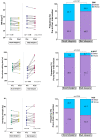Exercise Training Program Improves Subjective Sleep Quality and Physical Fitness in Severely Obese Bad Sleepers
- PMID: 36360611
- PMCID: PMC9658425
- DOI: 10.3390/ijerph192113732
Exercise Training Program Improves Subjective Sleep Quality and Physical Fitness in Severely Obese Bad Sleepers
Abstract
Background: Sleep quality is an important modulator of neuroendocrine function, as sleep problems are related to metabolic and endocrine alterations.
Objective: The main objective was to determine the effects of an exercise training program on the sleep quality of severely obese patients with sleep problems. The secondary objective was to determine the relationship between fitness and anthropometric parameters with sleep quality scores.
Methods: Thirty severely obese patients participated in 16 weeks of PA intervention (age: 39.30 ± 11.62 y, BMI: 42.75 ± 5.27 kg/m2). Subjective sleep quality, anthropometric parameters, and fitness (i.e., handgrip strength and cardiorespiratory fitness) were measured.
Results: Two groups were defined as good sleepers (n = 15, 38.06 ± 12.26, men = 1) and bad sleepers (n = 15, 40.53 ± 11.23, men = 3). The good sleeper group reported improvement in cardiorespiratory fitness (61.33 ± 68.75 m vs. 635.33 ± 98.91 m, p = 0.003) and handgrip strength (29.63 ± 9.29 kg vs. 31.86 ± 7.17 kg, p = 0.049). The bad sleeper group improved their cardiorespiratory fitness (472.66 ± 99.7 m vs. 611.33 ± 148.75 m, p = 0.001). In terms of sleep quality dimensions, the bad sleeper group improved their subjective sleep quality (p < 0.001), sleep latency (p = 0.045), sleep duration (p = 0.031), and habitual sleep efficiency (p = 0.015). Comparing the changes in both groups (∆), there were differences in subjective sleep quality scores (∆ = 2.23 vs. ∆ = -3.90, p = 0.002), where 86.6% of the bad sleeper group improved sleep quality (p = 0.030). An increase in handgrip strength was correlated to improving sleep quality scores (r = -0.49, p = 0.050).
Conclusions: Severely obese bad sleepers improved their subjective sleep quality, the components of sleep, and cardiorespiratory fitness through an exercise training program. Improvement in subjective sleep quality was linked to an increase in handgrip strength.
Keywords: exercise; morbid obesity; quality of life; sleep quality.
Conflict of interest statement
The authors declare no conflict of interest.
Figures



Similar articles
-
Physical Fitness and Sleep-Related Problems Among Adolescents: Findings From the EHDLA Study.Scand J Med Sci Sports. 2025 Mar;35(3):e70037. doi: 10.1111/sms.70037. Scand J Med Sci Sports. 2025. PMID: 40105037
-
Muscle Quality Index in Morbidly Obesity Patients Related to Metabolic Syndrome Markers and Cardiorespiratory Fitness.Nutrients. 2023 May 25;15(11):2458. doi: 10.3390/nu15112458. Nutrients. 2023. PMID: 37299421 Free PMC article.
-
Beneficial effects of a lifestyle intervention program on C-reactive protein: impact of cardiorespiratory fitness in obese adolescents with sleep disturbances.Am J Physiol Regul Integr Comp Physiol. 2019 Apr 1;316(4):R376-R386. doi: 10.1152/ajpregu.00309.2018. Epub 2019 Feb 21. Am J Physiol Regul Integr Comp Physiol. 2019. PMID: 30789791
-
Weight Status Is Related to Health-Related Physical Fitness and Physical Activity but Not to Sedentary Behaviour in Children.Int J Environ Res Public Health. 2020 Jun 23;17(12):4518. doi: 10.3390/ijerph17124518. Int J Environ Res Public Health. 2020. PMID: 32586009 Free PMC article.
-
Combined Aerobic and Resistance Training for Cardiorespiratory Fitness, Muscle Strength, and Walking Capacity after Stroke: A Systematic Review and Meta-Analysis.J Stroke Cerebrovasc Dis. 2020 Jan;29(1):104498. doi: 10.1016/j.jstrokecerebrovasdis.2019.104498. Epub 2019 Nov 13. J Stroke Cerebrovasc Dis. 2020. PMID: 31732460
Cited by
-
The effect of physical activity on anxiety through sleep quality among Chinese high school students: evidence from cross-sectional study and longitudinal study.BMC Psychiatry. 2025 May 16;25(1):495. doi: 10.1186/s12888-025-06909-x. BMC Psychiatry. 2025. PMID: 40380339 Free PMC article.
References
-
- Vail-Smith K., Felts W.M., Becker C. Relationship between sleep quality and health risk behaviors in undergraduate college students. Coll. Stud. J. 2009;43:924–930.
Publication types
MeSH terms
LinkOut - more resources
Full Text Sources
Medical
Research Materials

